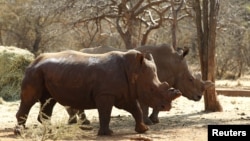LONDON —
For generations of children in Ipswich, a sleepy English market town, Rosie the Indian rhinoceros has been the star attraction at the local museum.
But that changed in July, says Councilor Bryony Rudkin, when gang of thieves broke into the museum and stole Rosie’s horn.
“We have other valuable items, but they knew exactly what they wanted and did not take anything else. It was very targeted," she says. "All we know is a market exists for this horn. It seems some people believe it can be a cure for cancer or an aphrodisiac.”
Acquired from London’s Natural History Museum in 1907 in exchange for $30 and a stuffed pig, the much-loved rhino's horn, were it ground and sold to anyone in East Asia persuaded by the myth of its curative powers, might fetch $300,000.
“It felt wrong. It felt we had been violated and a community symbol had been lost," says Rudkin. "But if there is anything good to come out of this, it is that years after her death Rosie will be able to highlight what a pernicious trade rhino poaching is.”
Rosie’s case is not unique. While the trade in rhino horn is banned under international law, demand in Asia is soaring, and crime syndicates are not only poaching wild rhinos, but also stealing horns from museums. According to reports by Europol officials, an Irish crime syndicate is behind a wave of similar thefts from museums across Europe, numbering 70 since 2011, and now copycat cases are now occurring as far away as Brazil.
Toxic preservatives used
In the last few weeks, British police in Surrey, near London, prosecuted two men for stealing horn from another provincial museum; Haslemere. The culprits were jailed for seven years.
Detective David Pellatt, who headed this investigation, warns that rhino horn held in museum collections is preserved in toxic chemicals. It therefore represents a major public health risk if consumed as a medicine or, as increasingly occurs in Vietnam, in designer cocktail drinks.
“It is treated with chemicals, including arsenic," he says. "This is all ground down in the horn. People are taking this powder not knowing what is in there. Who knows what the consequences might be.”
The poisoning issue resonating beyond the realm of public health. In South Africa, 455 rhino have already been poached this year, compared to 30 in 2007.
Ethical questions
Ethical questions
With poachers and traffickers in ascendency, some conservationists are exploring ways of destroying the trade by intentionally poisoning rhino horn consumers.
Among them, reports Cathy Dean, director of Britain-based Save the Rhino, is Ed Hern, a game reserve owner who has lost several rhino to poachers.
“He was so angry, he said very openly he was going to treat his rhinos with poison," says Dean. "He is essentially saying to any poacher, if you come and kill my rhino you risk killing the people who buy your horn."
Dean does not condone such radical action. Nor is it without risk to the animal. Earlier this year, one of Hern’s rhino, named Spencer, died of a heart attack while being anaesthetized for a procedure to inject poison into his horn.
“You drill holes in the horn, drip in poison and seal it with wax," she says. "After a few days it looks like the horn has never been treated. There are rumors other people are already doing this on the quiet so the horn leaks into the market and mysterious deaths start happening.”
Julie Ayling, an organized crime expert at Australia National University, agrees that serious ethical questions need to be asked about what constitutes an acceptable response to poaching.
Targeting consumers is misguided, she argues, particularly when so many people in East Asia are unaware that rhino is an endangered species and the trade in its horn the preserve of criminal gangs.
Targeting consumers is misguided, she argues, particularly when so many people in East Asia are unaware that rhino is an endangered species and the trade in its horn the preserve of criminal gangs.
“There is an element of desperation because so clearly rhino are on a trajectory towards extinction," says Ayling. "But we need a societal response — education so people understand the problem; law enforcement responses; and for people to value wildlife. Harming fellow human beings is not something I would choose as a good strategy.”
Thai and Vietnamese newspapers have linked at least two deaths to the consumption of toxic rhino horn. But there has been no firm evidence that intentionally tainted rhino horn has been consumed.
As the poaching crisis escalates, and conservationists consider increasingly radical ways to save the species from extinction, it isn't only the rhino's life is at risk.





